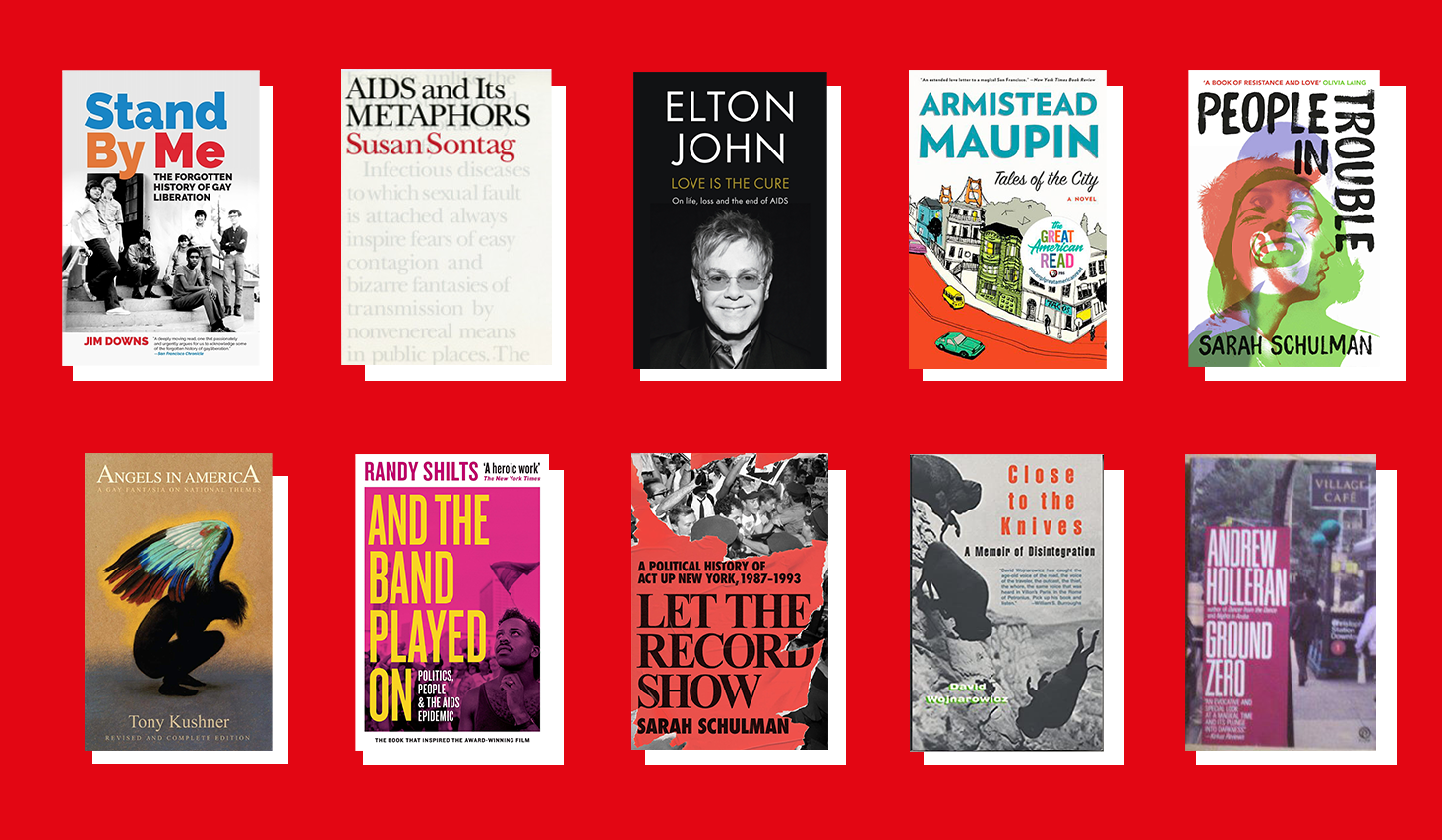
The HIV/AIDS crisis disproportionately affected the LGBTQ+ community, yet the history behind the epidemic is not commonly taught. For many of us, this can be a whole new era to understand and learn about.
To tackle this (and make the education around HIV/AIDS more accessible), GAY TIMES has put together a distinct list of books (fiction, non-fiction, prose, poetry, and more) to explore how the LGBTQ+ community was impacted by this disease.
From moving memoirs to powerful autobiographical storytelling, we’ve included a comprehensive list of recommendations for readers to delve into HIV/AIDS history.
1. And the Band Played on: Politics, People, and the AIDS Epidemic by Randy Shilts
Set in 1987, And the Band Played on won the Stonewall Award for its incredible writing. It’s a necessary read for those wanting to understand how the HIV/AIDS crisis first emerged and, later, swept through the US leading to thousands of fatalities. In an intensely detailed retelling, author Shilts comprehensively delves into the world of journalism, politics, healthcare, and history to pinpoint key moments in the epidemic. From the virus’ origin in Africa, the reigning wave of gay liberation, this book is heartbreakingly honest in its investigation and stands as a powerful reminder of what has past should not be forgotten.
2. AIDS and Its Metaphors by Susan Sontag
A follow-up to Sontag’s popular critical theory publication Illness as a Metaphor, AIDS and Its Metaphors examines the language and stigmatisation attached to the virus, particularly the ways in which these elements contribute to how those infected with the disease are dehumanised. Split into eight succinct sections, Sontag tackles meaningful topics such as the State’s fear-mongering of HIV/AIDS, issues of racism, and class discrimination towards minorities to offer an alternative perspective on the crisis. Both Illness as a Metaphor and AIDS and Its Metaphors are must reads.
3. Angels In America by Tony Kushner
For those who prefer a bit of fiction, Angels In America is an acclaimed play that has been lauded for its observation of community, religion, and disease. Kushner’s play has been rehashed in various forms on-screen and off to explore the rise of AIDS during the Reagan era of New York City through the lens of three men. If you’re a literature (or drama) buff there’s a chance you have already come across this standout play, but if not – Angels In America is a bookshelf staple.
4. Close To The Knives by David Wojnarowicz
A powerful memoir, Wojnarowicz’s collection of essays is a moving collection that unravels his life from his violent childhood to homelessness in New York City. A visceral read, this book is a nuanced book unearthing how American State oppression and the subjugation of the queer community was achieved by violence, fear, and stigmatisation. Often labelled a “memoir of disintegration”, we would call Close To The Knives an essential read.
5. Let The Record Show by Sarah Schulman
A deep dive into the realities of America’s AIDS crisis, Schulman charters how events of activism and crisis come together in this ground-breaking tour de force. A compilation of historical research and countless interviews with the AIDS Coalition, Let The Record Show returns to the frontlines of the pandemic. Blending past and present of the ACT UP archives, Schulman reminds us of the efforts that went into an era dominated by fear and frustration, and how the grassroots organisation changed the face of the AIDS crisis.
6. Tales of the City by Armistead Maupin
Maupin’s Tales of the City is a series of nine novels published between 1978 to 2014. The book has been recognised for its cultural impact as a time capsule to San Francisco in 1976 and its prominent LGBTQ+ community. The first book, a same-titled release, examines a story of friendship, closeness, and struggle.
7. People In Trouble by Sarah Schulman
A brilliant read, People In Trouble focuses on a love triangle (between Peter, Kate, and Polly) during the AIDS breakout. Written from the perspective of Schulman (a gay activist), the novel unpacks a unique relationship with Act Up, and the LGBTQ+ community. People In Trouble expertly balances art, activism, politics, and more to bring 1980s New York to life.
8. Stand By Me by Jim Downs
Much of queer history is often overlooked, not taught in schools, or commonly covered. In his novel, Stand By Me: The Forgotten History of Gay Liberation, historian Downs does exactly as his title promises. A thoroughly researched read, this book platforms a multitude of achievements occurring across the 1970-80s. More so, Stand By Me spotlights Los Angeles, New York, and Philadelphia to offer a shared perspective of lives and stories that felt incompatible with mainstream American life.
9. Love Is The Cure by Elton John
An account of Elton John’s life during the AIDS era and his experiences during that time. An outspoken activist and LGBTQ+ figure, the artist has dedicated much of his life to challenging the stigma of HIV/AIDS, including launching the Elton John AIDS Foundation which raises funds to combat the disease worldwide. Love Is The Cure includes stories from Ryan White, Freddie Mercury, Princess Diana, Elizabeth Taylor, and others, and the emergence of the foundation.
10. Ground Zero by Andrew Holleran
A moving collection of essays documenting New York in the 1980s, Ground Zero brings the focus of the community, life, loss, and humanity to the forefront. Holleran distinctly captures a landscape that many will remember and new generations can experience through this powerful series. Holleran’s effective writing (and storytelling) is something that will stick with you.



